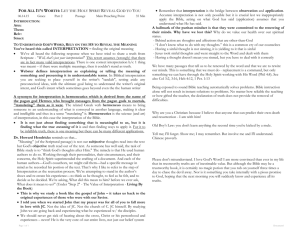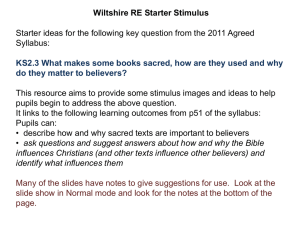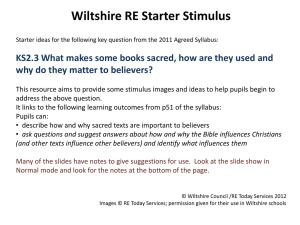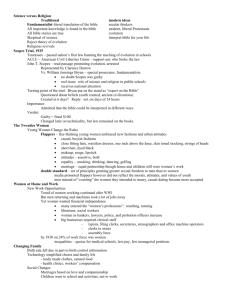Authority and the Word of God
advertisement
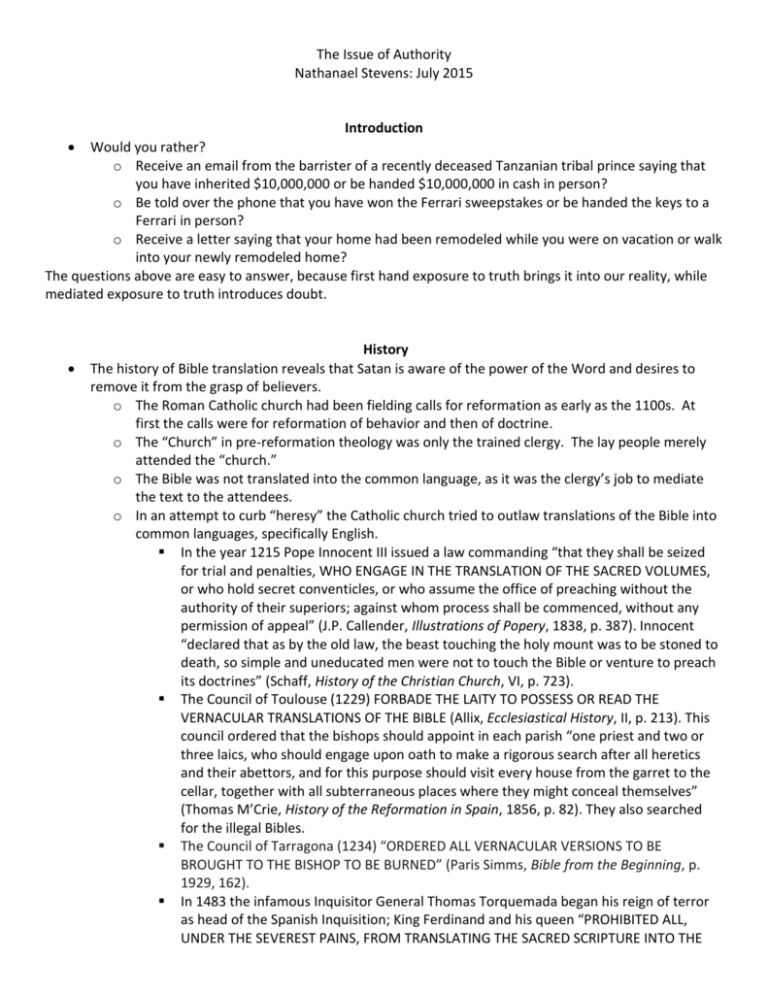
The Issue of Authority Nathanael Stevens: July 2015 Introduction Would you rather? o Receive an email from the barrister of a recently deceased Tanzanian tribal prince saying that you have inherited $10,000,000 or be handed $10,000,000 in cash in person? o Be told over the phone that you have won the Ferrari sweepstakes or be handed the keys to a Ferrari in person? o Receive a letter saying that your home had been remodeled while you were on vacation or walk into your newly remodeled home? The questions above are easy to answer, because first hand exposure to truth brings it into our reality, while mediated exposure to truth introduces doubt. History The history of Bible translation reveals that Satan is aware of the power of the Word and desires to remove it from the grasp of believers. o The Roman Catholic church had been fielding calls for reformation as early as the 1100s. At first the calls were for reformation of behavior and then of doctrine. o The “Church” in pre-reformation theology was only the trained clergy. The lay people merely attended the “church.” o The Bible was not translated into the common language, as it was the clergy’s job to mediate the text to the attendees. o In an attempt to curb “heresy” the Catholic church tried to outlaw translations of the Bible into common languages, specifically English. In the year 1215 Pope Innocent III issued a law commanding “that they shall be seized for trial and penalties, WHO ENGAGE IN THE TRANSLATION OF THE SACRED VOLUMES, or who hold secret conventicles, or who assume the office of preaching without the authority of their superiors; against whom process shall be commenced, without any permission of appeal” (J.P. Callender, Illustrations of Popery, 1838, p. 387). Innocent “declared that as by the old law, the beast touching the holy mount was to be stoned to death, so simple and uneducated men were not to touch the Bible or venture to preach its doctrines” (Schaff, History of the Christian Church, VI, p. 723). The Council of Toulouse (1229) FORBADE THE LAITY TO POSSESS OR READ THE VERNACULAR TRANSLATIONS OF THE BIBLE (Allix, Ecclesiastical History, II, p. 213). This council ordered that the bishops should appoint in each parish “one priest and two or three laics, who should engage upon oath to make a rigorous search after all heretics and their abettors, and for this purpose should visit every house from the garret to the cellar, together with all subterraneous places where they might conceal themselves” (Thomas M’Crie, History of the Reformation in Spain, 1856, p. 82). They also searched for the illegal Bibles. The Council of Tarragona (1234) “ORDERED ALL VERNACULAR VERSIONS TO BE BROUGHT TO THE BISHOP TO BE BURNED” (Paris Simms, Bible from the Beginning, p. 1929, 162). In 1483 the infamous Inquisitor General Thomas Torquemada began his reign of terror as head of the Spanish Inquisition; King Ferdinand and his queen “PROHIBITED ALL, UNDER THE SEVEREST PAINS, FROM TRANSLATING THE SACRED SCRIPTURE INTO THE VULGAR TONGUES, OR FROM USING IT WHEN TRANSLATED BY OTHERS” (M’Crie, p. 192). For more than three centuries the Bible in the common tongue was a forbidden book in Spain and multitudes of copies perished in the flames, together with those who cherished them. In England, too, laws were passed by the Catholic authorities against vernacular Bibles. The Constitutions of Thomas Arundel, issued in 1408 by the Archbishop of Canterbury, made this brash demand: “WE THEREFORE DECREE AND ORDAIN THAT NO MAN SHALL, HEREAFTER, BY HIS OWN AUTHORITY, TRANSLATE ANY TEXT OF THE SCRIPTURE INTO ENGLISH, OR ANY OTHER TONGUE, by way of a book, libel, or treatise, now lately set forth in the time of John Wyckliff, or since, or hereafter to be set forth, in part of in whole, privily or apertly, upon pain of greater excommunication, until the said translation be allowed by the ordinary of the place, or, if the case so require, by the council provincial” (John Eadie, The English Bible, vol. 1, 1876, p. 89). Consider Arundel’s estimation of the man who gave the English speaking people their first Bible: “This pestilential and most wretched John Wycliffe of damnable memory, a child of the old devil, and himself a child or pupil of Anti-Christ, who while he lived, walking in the vanity of his mind … crowned his wickedness by translating the Scriptures into the mother tongue” (Fountain, John Wycliffe, p. 45). o Those who translated the Bible were thus condemned as heretics. John Wycliffe (1331-1334) First to translate the Bible into English (1382)—Protected by royalty, but had his buns dug up and burned in effigy after the Council of Constance in May 1415. William Tyndale (1494-1536) First to translate the Bible into English from the original languages. Strangled to death while tied at the stake, then burned as a heretic. The Present Mediation Common Bible Study Practice: Text time: 45 seconds reading the passage (if actually read at all). For teachers o Original language tools: 3 hours doing words studies, 2 hours using language tools to study grammar. o Scholarly research: 4 hours reading commentaries. o Theological determination: 1 hour sifting all we have gleaned through our theological grid. Devotional Christian radio Podcast Christian music Spiritual self-help books What is left out of the “study methods” above is deep communion with God through His Word. We should be spending the vast majority of our time in the text alone with God (original language or otherwise). In the United States, we have one of the best-educated and largest pools of educated clergy, not to mention a large and well-educated lay population. Study resources that cost thousands of dollars even ten years ago are available for free online for anyone who is interested. Yet, the church in the United States has only become more anemic; culturally, socially, and evangelistically. The problem is twofold. 1) Believers are motivated by the desire to gain knowledge of the Bible or theology rather than by the desire to commune with God. 2) Believers have exchanged the interpretive authority of God for the interpretive authority of men (a religious personality, a popular theological system, etc.). Practically speaking, we spend the bulk of our time communing with study materials for the purpose of gaining knowledge, rather than communing with God to have Him change our life. Dangerous Motivations You search the Scriptures because you think that in them you have eternal life; it is these that testify about Me; and you are unwilling to come to Me so that you may have life. John 5:39-40 Jesus condemned the Jews because they studied the Bible without seeing (communing with) Him. Jesus goes on to say that He is not the one who will condemn the Jews, but Moses is, referring to what Moses wrote. By exposing themselves to the Bible with wrong motivations, the only thing they accomplished was intensifying their guilt. In summation, Paul says that knowledge puffs up. Knowing the Bible and knowing God are two very different things. The proper motivation for opening the Bible must be to know God and be changed by Him. God as the Mediator of His Word For the word of God is living and active and sharper than any two-edged sword, and piercing as far as the division of soul and spirit, of both joints and marrow, and able to judge the thoughts and intentions of the heart. And there is no creature hidden from His sight, but all things are open and laid bare to the eyes of Him with whom we have to do. Hebrews 4:12-13 1 The Word of God is dynamic because of the Spirit of God. o What is “rest”? This passage in Hebrews is about believers, not unbelievers. “Rest” and whether or not Christians will enter it is the central theme of the passage beginning at 4:1 The “rest” is the full-orbed inheritance that awaits faithful Christians in the Millennium. o The eschatological nature of “rest” in the passage informs the nature and work of the Word of God. The Word of God is living and active. If Luke is indeed the author of Hebrews, machairan (sword) may well mean a surgeon’s knife as it is used as such in extra biblical references.1 The Word of God has the ability to “vivisect” (“the division of the soul and spirit, joints and marrow”) the believer. The piercing action of the Word of God judges the believer’s thoughts and intentions. Because of the piercing abilities of the Word, believers will be judged by it before God at the Bema Seat. The verbs “piercing” and “judging” indicate personal intelligence, which has led some to conclude that the “Word of God” is Jesus. And yet, as a standard of judgment, an impersonal object is indicated. Allan, Hebrews; p. 289. The shift from impersonal to personal between verses 13 and 14 indicate that God is the One before whom we will be laid bare, and what is revealed by the “laying bare” will be judged according to God’s Word, the Bible. “Laid bare” pictures a choke hold on the neck of a wrestler by another and means, “total exposure and utter defenselessness.”2 The laying bare is present tense, but we “we have to do” indicates a future event. These things I have spoken to you while abiding with you. But the Helper, the Holy Spirit, whom the Father will send in My name, He will teach you all things, and bring to your remembrance all that I said to you. John 14:25-26 Specifically in this context, the Holy Spirit is going to teach (interpret) for the disciples, after the death and resurrection of Jesus, what He taught, and “all things.” The teaching ministry of the Holy Spirit continues today, and is based on interpreting and applying the Word of God to believers. These things I have written to you concerning those who are trying to deceive you. As for you, the anointing which you received from Him abides in you, and you have no need for anyone to teach you; but as His anointing teaches you about all things, and is true and is not a lie, and just as it has taught you, you abide in Him. 1 John 2:26-27 John urges the church to reject those who claim to have authority, and instead rely on the Holy Spirit. Believers must submit to the Holy Spirit in every arena of life, including the interpretation of the Bible. In summation, the Bible is dynamic because God wrote it and applies it to the life of the believer. He communes (piercing, judging) with believers through it. He interprets and applies it to believers. Believers should read the Bible with the motivation to submissively commune with God so that God can transform their life into one that is reward-able (Hebrews 4:12-13). Mediated Anemic Truth vs. Communion with God “If one-tenth of what you believe is true, you ought to be ten times more excited than you are.” Sir Walter Moberly, The Crisis in the University. When we know of God’s love because He has spoken it to us through His Word, we rest in it. When knowledge of His love has been given to us through mediated sources, we may give lip service to that truth, but we don’t find our life and sustenance there. We should approach the work of scholars and theologians with gratitude for the work of God through them in the unveiling of doctrines and orthodoxy, but not with slavish submission. They are not THE authority on the Word of God; God is the authoritative interpreter of His Word. (Mark 2:23-3:6; Matthew 5:17, 21-22; 27-28; 31-32; 33-34.) We must read the Bible to commune with God, resting in the Holy Spirit’s authority to teach us through it. 2 Ibid: 289.



